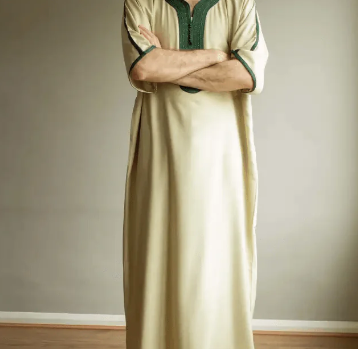In the complex tapestry of cultural expressions worldwide, clothing conveys heritage, values, and identity. In many Muslim communities, the kufi is a unique head covering among many traditional clothes and accessories. Do Muslim men have to cover their heads? Do men have to wear kufi?
The Cultural Importance of the Kufi
The kufi, also known as a taqiyah or a topi, is a brimless cap worn by males in Muslim communities worldwide. Its origins date back to the time of the Prophet Mohammad ﷺ and have historical and cultural importance.
While the Quran does not require it, many men wear it as a mark of humility, religious identification, and cultural pride. In Islamic traditions, it is frequently connected with humility and devotion.
Shop our thobes UK here.
Do Men Have to Wear Kufi?
Men are not obligated to always wear a kufi according to Islamic principles. Instead, Islam emphasises that men and women dress modestly. Wearing a kufi is a personal decision for some, not a religious requirement.
Scholars differ on whether it is desirable or Sunnah (a practice of the Prophet Muhammad ﷺ). At the same time, some regard it as a cultural habit rather than a religious obligation.
Regional and Cultural Differences
Wearing a kufi varies according to geography and community throughout the Muslim world. It's an essential aspect of traditional attire in specific locations but not so much in others. Local conventions, cultural influences, and personal preferences impact the kufi's significance in many countries.
Identity and Respect Symbol
Donning a kufi has a special meaning for many people. It's a method for them to visibly demonstrate their devotion to Islamic beliefs, respect for tradition, and sense of connection to their cultural heritage. Some people wear it as a sign of respect when participating in religious rites or attending communal meetings.
The Choice of Personal Freedom
The decision to wear a kufi is ultimately up to the individual. Within the framework of Islamic principles, Islam stresses personal freedom. Men may wear kufi to display their faith or cultural background. In contrast, others may decide not to without jeopardising their religious beliefs.
Final Wrap Up
In many Muslim societies, the question, 'Do men have to wear kufi?' is often raised. The kufi is valued as a sign of humility, tradition, and religious identity. Its usage, however, is not widely prescribed in Islam. Instead, it signifies personal preference, cultural affinity, and a link to one's ancestors. Whether worn on a daily, irregular, or seldom basis, New Arabia – a modest attire centre in the UK, suggests that wearing a kufi is a highly personal decision, reflecting the diversity and depth of Muslim traditions.
While the kufi has significant cultural and religious significance for many, it is not a required piece of clothing in Islam, leaving the decision to wear it or not to the individual.



